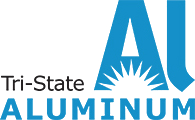Pure aluminum has poor mechanical properties, so it’s not viable as an industrial raw material. But when aluminum is alloyed with other metals, it becomes strong and versatile enough for industrial use. The manufacturing, construction, and transportation industries are all big consumers of aluminum alloys.
Aluminum alloys are grouped into several series based on the other metals in the alloy. The 6000 series alloys contain mainly magnesium and silicon. These alloys are heat treatable and are excellent for manufacturing purposes since they offer good machinability, formability, and weldability. They enjoy a high strength-to-weight ratio and resist corrosion well. These factors make the 6000 series a popular choice for aluminum extrusions.
The Importance of Choosing the Right Aluminum Extrusion Alloy
Even though many alloys in the 6000 series can be used to make extrusions, not all of them are equally suited to all jobs. Manufacturers must select the alloy with the correct properties for their specific product. The important factors to consider include:
- Performance: It’s important to assess the mechanical strength and surface finish of the alloy. In general, the finish and strength characteristics will determine the applications in which the alloy would best perform. Some alloys have a poor finish but great strength—the poor finish makes them unsuitable as external-facing pieces, but they’re eminently suitable for internal load-bearing structures.
- Design: This generally refers to the post-extrusion operations performed on the alloy. These operations include cutting to length, deburring, drilling or punching holes, anodizing, powder coating, painting, Heli-coiling, and assembly.
- Tolerances: Manufacturers should specify a tolerance range appropriate to the size of the product. The general rule is, the larger the product’s dimensions, the wider the tolerance range.
Our experts at Tri-State Aluminum can help you select the best 6000 series aluminum alloy for your product.
Types of 6000 Series Aluminum Alloys
This is a brief overview of a few important alloys in the 6xxx series. They vary from each other in the amount of magnesium and silicon in them. For more information, see Tri-State Aluminum’s Wrought Alloys Table for nominal compositions.
Aluminum 6005
This alloy has excellent extrudability and strength as well as good formability, weldability, machinability, and finish characteristics. However, it does not resist impacts well. Aluminum 6005 is primarily used to fabricate wrought products.
Aluminum 6105
This material alloys with both magnesium and silicon and is also used to fabricate wrought products. It typically comes in one of two variations: 6105-T1 and 6105-T5.
Aluminum 6061
Aluminum 6061 offers excellent strength, corrosion resistance, and machinability as well as good formability and weldability. However, it also has a poor finishing response. The main temper variations of 6061 are 6061-T1, -T4, -T42, -T451, -T4510, -T4511, -T51, -T6, -T62, -T651, -T6510, -T6511, -T652, -T89 and -T94.
Another variation of this alloy is aluminum 6061-O, which is in the annealed condition and has the lowest strength among all 6061 variations.
Aluminum 6063
Commonly called the “architectural alloy,” aluminum 6063 is the most cost-efficient choice for a wide range of architectural applications. It has good corrosion resistance as well as solid finish, machinability, formability, and weldability capabilities. Common uses for it include the fabrication of doors, window frames, shop fittings, and irrigation tubes. It’s also used to build extrusions with intricate patterns.
Aluminum 6463
This aluminum produces a bright, mirror-like, high-quality finish, and it also possesses good formability and machinability characteristics. Its most common temper variations are 6463-T1, -T4, -T5, -T6, and -T62.
Common Uses
Common uses are for reference only. Consult your qualified engineer before specifying alloys. Tri-State Aluminum offers no warranty of suitability for a particular end use.
6005/6105 – Building & Construction, Consumer Durables, Fixtures and Framing, Marine, Display, Signage & Advertising, Ladders and Platforms. These alloys are typically used where finishing and strength may be required.
6061 – Building & Construction, Aerospace/Defense, Structural Membranes, Enclosures, Screw Machine, Manifolds, Heat Sinks, Truck Trailer, Automotive, Distribution, Marine, Welded and Fabricated Parts, Fencing, Scaffolding & Tent Poles, Highway Signage
6063 – Signage, Display & Advertising, Consumer Durable, Filter Framing, Solar, Door & Window, Security Screens, Levels and Rulers, Electronic Cabinetry, Fencing, Lighting Fixtures, Electrical Components and Conduit, Hinges, Flooring & Decking. This alloy is typically used where finishing may be required.
6463 – Shower Enclosures, Picture Framing, Automotive Trim, Display & Advertising
Contact Tri-State Aluminum for All Your 6000 Series Aluminum Alloy Needs
Because there are so many different types of aluminum alloys, it’s best to work with an expert to select the right one for your next project. Tri-State Aluminum offers a comprehensive suite of 6000 series aluminum products and services, and we collaborate with clients across the country to deliver top-quality aluminum solutions.
Please contact us today if you would like to learn more about how we’ll help with your next project.

